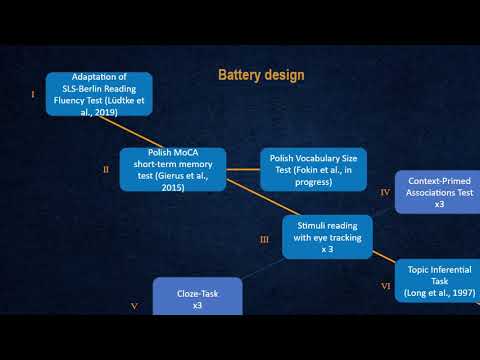 Speaker: Danil Fokin @Danil_Fokin
Speaker: Danil Fokin @Danil_Fokin
 Affiliation: University of Warsaw
Affiliation: University of Warsaw
 Co-authors: Łukasz Wróbel, & Monika Płużyczka
Co-authors: Łukasz Wróbel, & Monika Płużyczka
Title: The Depth beyond Lines: the Test Battery on Expert-Novice Poetry Reading in Polish
Abstract (long version below): To explore expertise-dependent poetry reading strategies and the impact of poetic tropes on reading-related cognitive processes, we developed the battery of tests coupled with eye tracking. The battery includes the Polish adaptation of SLS-Berlin reading proficiency and Polish MoCA short-term memory tests, Context-Primed Associations Test, Cloze-Task, and Topical Inferential Task. The paramount aim is to cover methodological lacuna in Polish empirical poetics, presenting a reliable tool to delve into comprehension processes across various levels of poetry reading from word recognition to poetic figures understanding.

 Long abstract
Long abstract
To explore expertise-dependent reading and comprehension strategies involved in Polish poetry processing, we developed the battery of tests coupled with eye tracking. The methodology is intended to cover the methodological lacuna existed in empirical studies of Polish poetry and expected to be a robust tool for experimental research on poetry reception.
Background
Print exposure affects reading behaviour, impacting eye movement patterns, reading efficiency, the quality of mental representations of a text, and high- and low-level comprehension processes, including integrative and inferencing skills. The reading process is also influenced by the text genre.
Poetry is characterized by poetic figures, i. e. tropes, syntax violations, and specific visuo-spatial organization. It is read differently than prose and varied within poetic genres, e. g. haiku or sonnets, and types, e. g. metered, rhymed etc. Further, tropes affect the reader’s aesthetical evaluation of the poem.
Experts in poetry have advanced skills in figurative language understanding, imagination, and metaphorizing; demonstrate exceptional skills in lexical choice, poetic form’s reception, and phonological anticipation. Thus, along tropes and visuo-spatial organization, expertise is a key predictor of reading behaviour.
Present study
We developed a toolkit that may assess co-influence of two predictors – print exposure and poetic figures (enjambement, metaphor, rhyme) while reading poetry. The need for such a tool is driven by the lack of methodologies available in Polish. We assume that poetry exposure: 1. contributes to the formation of advanced poem’s mental representations and simplifies content evocation; 2. increases one’s inferential skills, and 3. results in higher variability, abstractedness, and density of associations.
To address these assumptions, we designed a toolkit expected to be a robust tool for exploration both poetry exposure and poetic features on reading behaviour and revealing expert-novice differences across diverse levels of reading and comprehension processes.
Procedure and methodology
The test battery contains five experiments coupled with eye tracking: Polish adaptation of the SLS-Berlin reading proficiency and Polish MoCA short-term memory tests, Context-Primed Associations Test, Cloze-Task, and Topic Inferential Task. The stimuli items, in turn, represent various poetic tropes and their influence is calculated within mixed-linear model.
Polish adaptation of SLS-Berlin, originally developed for German, aims to evaluate reading proficiency. Both groups read 77 correct and incorrect sentences, judging their correctness and assessing complexity on a 5-points scale. Participants’ eye movements, response time, and accuracy are measured. We assume equal reading proficiency in both groups.
Polish MoCA short-term memory test evaluates one’s memory capacity. Participants listen to the five words and, in 5-minutes break, orally recall them. Assessing accuracy, we expect comparable short-term memory capacity in two groups. Both tests are preliminary.
Context-Primed Associations Test (CPAT) is an adaptation of the Free Associations Test, intended to test the spreading contextualization hypothesis that suggests contextual activation of word meaning. After reading each of four stimuli poems, participants complete CPAT. First, they are demonstrated eight words (5 stimuli vs 3 fillers), one at a time and decide whether the lexeme appeared in the poem (“yes”/”no”); if “yes”, they provide as much context as possible. The first question is leading, aiming to evoke poem content. Then, both groups provide the first five words that first come to mind upon seeing the stimulus. We predict large context provided by experts, context-dependent variation in associations, and between-group differences in variations, abstractedness, and density of associations.
Cloze-Test (CT) evaluates participants’ verbatim memory and the ability to use contextual clues to restore gaps. CT follows the association test. Up to 10 words are removed from the poem and participants fill gaps from memory. Eye movements, response time and accuracy are measured, assuming that experts complete the task with a higher speed and less contextual information needed for content recall.
Topic Inferential Task examines participants’ abilities to draw topical inferences between and within poems. It is performed after completing the reading of all stimuli poems. Initially, participants decide which poems are thematically-related (4 stimuli vs 2 “no-match” fillers). Then, both groups read on the screen a sequence of two-lines extracted from poems, followed by three prime-target word pairs. These pairs are either topically-appropriate, -inappropriate, or fillers. Participants then select the pair that better fits the topic of a sentence. Accuracy and response time are measured, assuming that poetry exposure leads to formation of advanced low-level comprehension strategies.
The proposed test battery creates underpinnings for the evolution of empirical literary studies in Poland, forming the basis for further cross-linguistic research and providing a novel methodological toolkit.

